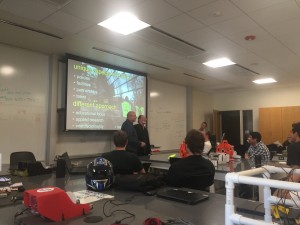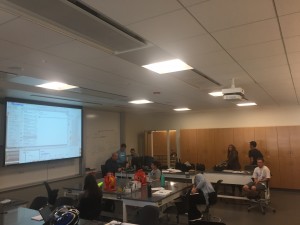Shakespeare is a timeless writer, as are the messages of his many, many plays and sonnets; the man who invented over half of the words in the average English speaker’s vocabulary has a lot to say. Hamlet, one of Shakespeare’s most illustrious works, has what I would say is his most indelible message. Its impression correlating to its pragmatism in all cultures, societies, and personal identities; the progenitor question of all philosophy: why? Shakespeare extends this question to many facets, but most notably to ‘why be’ (directly by the titular character), or more eloquently: why is it worthwhile to continue living.
The article “Backpacks and Briefcases” by Laura Bolin implores the reader — and potential writer – to be aware of rhetorical devices and how they support the text. The rhetorical situation – exigence, audience, and constraints – regarding the question “to be or not to be” is easily paralleled to Shakespeare’s own life, that being the death of his son, Hamnet, and the following bout of depression he faced which urged him to write the play (Hamlet Act III Scene I; Bolin 48); the exigence is brought to light when reflecting on the notion that his son, being only eleven at the time of his death, would part from the mortal plane so soon. If a youth as cherished as Shakespeare’s own son was seemingly not deserving of life, then what was the point of going on with his own? Further more, why should he suffer through his son’s death? Through this situation Shakespeare appeals to one of man’s most prominent folly’s: the query of purpose in being and purpose in suffering.
Shakespeare easily plays to the audience’s naturally occurring desire for purpose, an ever present thing in human existence (explaining, in part, why the context of the play is so ubiquitous). While there are many existential arguments as to why living is worthwhile, a nihilist perspective is arguably the more rational. Hamlet presents the argument that only a fool would bear the “whips and scorns of time, [the] oppressor’s wrong, the proud man’s contumely, ” et cetera, and it’s compelling; there’s every reason to side with these notions, as they are presented in an empathetic (pathos), logical way (logos) from an intelligent character written by a credible playwright (ethos) (Hamlet). However, Shakespeare never explicitly responds to this exigence, and that is the most poignant part of his argument.

The best the audience is given is a “let be” and somberly assuaging “the rest is silence” during the final scene of the play. Shakespeare masterfully makes the point that the constraints (ambiguity of an after life, moralistic implications of suicide, the church, et cetera) are entirely subjective, though they are inherently logical fears, and effectively responds to the exigence by doing absolutely nothing about it. However, that does not imply that the exigence is not worth considering; if that were the point there may as well be no play. The response is as open and pragmatic as the question itself and any one interpretation is arguably no more valid than another. It’s not an instruction; “the rest is silence” because we fill that silence.
Works Cites
Bolin, Laura Carroll. “Backpacks vs. Briefcases: Steps Toward Rhetorical Analysis.” Writing Spaces: Readings on Writing. Ed. Charles Lowe and Pavel Zemliansky. Vol. 1. West Lafayette, IN: Parlor P, 2010. 45-58. Writing Spaces. Web. 27 Jan. 2016.
Shakespeare, William. Hamlet. Ed. Harold Jenkins. London: Methuen, 1982. Print.















